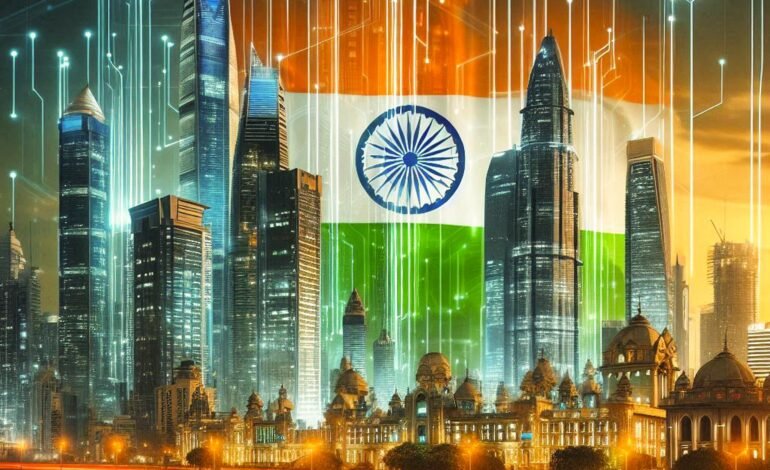The Digital Revolution in India

The Digital Revolution in India: How Technology is Shaping the Future
India, one of the world’s most populous nations, has emerged as a leader in the digital age, making groundbreaking strides in various fields of technology. Consequently, from rapid advancements in artificial intelligence (AI) to digital payments and space exploration, the country is undergoing a technological renaissance that is transforming its economy and society.
With a population of over 1.4 billion people and a growing number of tech-savvy citizens, India’s digital revolution is not only empowering its people but also positioning the country as a global tech powerhouse. Thus, in this blog, we explore the factors contributing to India’s rise in technology, the key sectors driving digital transformation, and the challenges that must be overcome to ensure sustainable growth.
India’s Technology Landscape: A Snapshot
India’s technological growth is not a new phenomenon. It has been steadily gaining momentum since the early 1990s when the IT sector began to expand rapidly. However, recent advances in AI, blockchain, and digital payments have propelled the nation’s tech scene to even greater heights. Below are some major elements shaping this evolving landscape:
Strong Government Support
The Indian government has recognized the potential of technology and actively supports its growth through various initiatives, such as Digital India and Make in India. Moreover, these programs aim to increase digital connectivity, promote local tech startups, and reduce reliance on foreign technology.
Increased Internet Penetration
India has witnessed a remarkable rise in internet penetration in recent years. Consequently, the wide availability of affordable smartphones and inexpensive data plans means millions of Indians now have online access. Therefore, they can engage with digital services, participate in e-commerce, and benefit from online education.
Thriving Startup Ecosystem
India’s startup ecosystem is flourishing, particularly in tech-driven sectors like fintech, health tech, and edtech. Notably, cities such as Bengaluru, Hyderabad, and Delhi are becoming global innovation hubs, attracting both domestic and international investors. Furthermore, the startup culture fuels growth in AI, cloud computing, and other emerging technologies.
Key Technological Sectors Driving India’s Digital Transformation
1. Artificial Intelligence and Machine Learning
AI and machine learning are revolutionizing industries across India. For instance, they improve efficiency in healthcare, agriculture, and manufacturing by streamlining processes and enhancing decision-making.
- Agriculture: AI-driven solutions help monitor crops, predict weather patterns, and optimize yield.
- Healthcare: Telemedicine and AI-assisted diagnostics enable remote care and faster medical treatments.
2. Fintech and Digital Payments
India has become a global leader in fintech innovation. Meanwhile, platforms like Paytm, Google Pay, and PhonePe are transforming the way Indians handle transactions.
- Unified Payments Interface (UPI): This system has made instant, low-cost payments simple, driving financial inclusion.
- Digital Wallets: Digital services reduce barriers for unbanked populations, thus contributing to a more inclusive financial ecosystem.
3. E-commerce and Online Retail
India’s e-commerce sector is thriving, primarily due to a large young population and expanded internet access. Consequently, platforms like Flipkart, Amazon India, and Myntra have grown significantly in recent years. Hence, as the middle class expands, online retail will likely see further gains.
4. Blockchain Technology
Blockchain is gaining significant traction in India’s financial and public sectors. Moreover, this technology is utilized in supply chain management, banking, and healthcare to enhance transparency and prevent fraud.
- Banking: Faster cross-border transactions and secure record-keeping.
- Public Services: Potential for secure land registry and identity management solutions.
5. Space Technology
India’s space program has garnered global recognition due to its cost-effective approach and ambitious missions. Notably, the Indian Space Research Organisation (ISRO) is behind successful endeavors like Mangalyaan (Mars Orbiter Mission) and Chandrayaan (Moon Mission). Additionally, these achievements bolster India’s reputation as a reliable partner for future international space collaborations.
Challenges Hindering India’s Technological Growth
Digital Divide
Despite rising internet penetration, a profound digital gap persists between urban and rural India. Consequently, many regions still lack high-speed internet and digital literacy programs, limiting access to technology-driven opportunities.
Cybersecurity and Data Privacy
Furthermore, the rapid move toward online services has elevated concerns about cyberattacks and data privacy. Therefore, India must invest heavily in cybersecurity infrastructure to protect citizens’ data and maintain a secure digital environment.
Lack of Skilled Workforce
Although India produces a large pool of engineering graduates, there remains a gap in skills needed for emerging technologies like AI, blockchain, and cybersecurity. As a result, companies and the government need to invest in education and training to meet evolving industry demands.
The Future of Technology in India
Looking ahead, India’s tech future appears incredibly promising. Additionally, the growth of 5G, AI, the Internet of Things (IoT), and smart cities will spur further innovation. Consequently, new technologies may transform healthcare, boost agricultural productivity, and address energy efficiency and waste management challenges.
With a strong entrepreneurial spirit, a fast-growing startup ecosystem, and ample government backing, India is poised to become a global technology leader shortly.
Conclusion
India’s digital transformation is reshaping industries, economies, and daily life. Moreover, pioneering developments in fintech, AI, blockchain, and space exploration highlight the nation’s emerging leadership in technology. Nevertheless, to ensure equitable growth, India must address the digital divide, enhance cybersecurity, and focus on upskilling its workforce. Ultimately, India’s commitment to innovation and its tech-savvy population will pave the way for an even brighter, tech-driven future.







